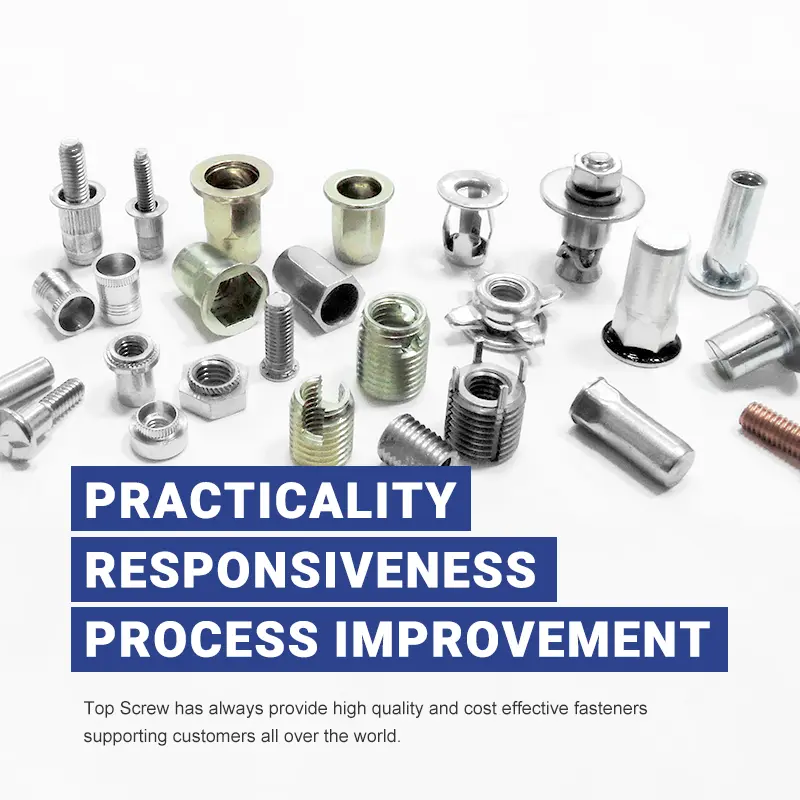How to Choose the Right Grooved Pin
Basic Introduction to Grooved Pins
Grooved pins are solid press-fit fasteners featuring three or more parallel grooves along their length, secured by interference fits into holes.
These pins are mainly used for joining, positioning, or fastening different components, offering a stable locking effect.
They are typically made of high-strength materials like carbon steel or stainless steel to withstand various load requirements and work environments.
Due to their simple installation and low cost, grooved pins are increasingly popular across industries such as automotive manufacturing, electronics assembly, precision machinery, and construction.
By creating a secure connection through interference fit, grooved pins greatly enhance assembly stability and durability, making them a safe and reliable fastening solution.
Applications of Grooved Pins in Machinery
In the machinery industry, grooved pins are widely used in equipment and structures due to their stable and durable characteristics.
They are commonly employed as locking devices, positioning elements, or pivot points, providing secure fastening even in high-load or high-vibration environments.
Grooved pins can bear radial and axial loads and have excellent torsion resistance, making them ideal for automotive parts, engine structures, machine tool components, and construction machinery.
Since grooved pins simplify assembly by reducing the need for welding or bolts, they offer significant advantages in terms of production efficiency and cost reduction.
Advantages of Grooved Pins in Assembly
Grooved pins offer numerous advantages in the assembly process, most notably simplicity and efficiency.
They can be directly press-fitted into pre-designed holes without requiring complex tools or high-temperature welding, significantly reducing installation time and labor costs.
With their interference fit, grooved pins secure parts without additional fasteners, preventing loosening and ensuring long-term stability.
Grooved pins' design allows them to withstand high loads and vibration, increasing connection stability while reducing maintenance and repair costs.
These characteristics make grooved pins particularly valuable in automated production lines, precision assembly, and large-scale manufacturing.
Structural Design Analysis of Grooved Pins
The structural design of grooved pins aims to enhance fastening effectiveness and load-bearing capacity.
The grooves on the pin body—usually three or more parallel grooves—not only increase friction between the pin and the hole wall but also improve the pin’s resistance to shear and tensile forces.
Grooved pins are typically cylindrical, with groove depth and placement customized according to application needs to ensure stable interference fits.
Made from carbon steel, stainless steel, or alloy steel, grooved pins often feature surface treatments like zinc plating to enhance corrosion resistance.
Precision calculations and testing ensure that grooved pins are suitable for a wide range of industrial environments.
Applications of Grooved Pins in Precision Machinery
In precision machinery, grooved pins are essential fasteners due to their high accuracy and stability.
Precision machinery demands strict positioning and fixation of parts, and grooved pins provide precise interference fits that prevent shifting or loosening of components.
Additionally, grooved pins are lightweight and straightforward, minimizing their impact on the weight or efficiency of precision equipment.
They are commonly used in precision instruments, medical devices, optical equipment, and aerospace components, where they maintain long-term stability under high accuracy requirements.
In these applications, the quality and precision of grooved pins directly affect the performance and lifespan of the equipment.
Special Application Cases of Grooved Pins
Grooved pins demonstrate unique value in specific applications due to their stable locking and positioning capabilities.
For example, in the aerospace sector, grooved pins are used in aircraft structures and spacecraft components because they remain reliable under high loads and extreme temperatures.
n medical equipment, grooved pins act as fastening elements for precision parts, ensuring long-term operational stability.
Grooved pins are also crucial in military equipment, heavy machinery, and marine engineering, particularly in scenarios requiring vibration resistance, corrosion resistance, and stable long-term operation.
These special cases highlight the versatility and strong adaptability of grooved pins.


